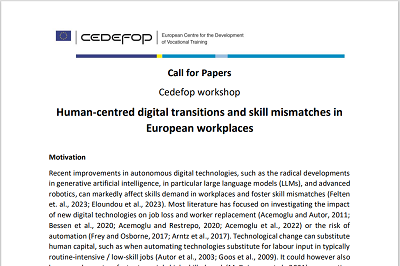Recent improvements in autonomous digital technologies, such as radical developments in generative artificial intelligence and advanced robotics, can markedly affect skills demand in workplaces and foster skill mismatches. In this research workshop, Cedefop invites the submission of research papers -some of which may apply to use the second European skills and jobs survey microdata- to investigate factors underlying the different forms of conjoined agency between humans and technology and how these may differ across workplace environments and human resource management practices. Understanding the conditions under which digital technologies may have positive or negative implications for workers’ upskilling and skills matching outcomes is a key aim of the workshop.
While much policy debate has been recently calling for a ‘human centred’ digital transition, further research is needed on the conditions under which new digital technologies may entail negative versus positive labour market outcomes for workers, and on how they may interact with their job tasks, upskilling needs and overall job quality. Deeper understanding of the interaction between technology adoption in workplaces, (algorithmic) management practices and investment in workers’ continuing skill development may assist in the design of a human-capital friendly regulatory framework.
Cedefop invites the submission of research papers that focus on, but are not restricted to, the following themes:
- How do (new) digital technologies interact with human capital and what factors determine if there is complementarity or substitutability of technology for skills?
- How do (new) digital technologies augment or restrict workers’ skilling needs?
- How is the labour market effect of digitalisation mediated by different job-skill requirements and alternative forms of work organisation?
- What type of skill mismatches are associated with the adoption of new digital technologies in workplaces?
- How does the adoption of digital technologies in firms interact with firm’s human resource management and skill utilisation strategies?
- What barriers may influence workers’ participation in education and training activities to cope with new digital technologies?
One of the main aims of the workshop will be to provide researchers with an opportunity to further improve the quality of their papers and to subsequently consider submitting them for publication in a special issue of Cedefop's working paper series and the Journal of Education and Work.
Interested researchers who wish to request for access to Cedefop’s second European skills and jobs survey (ESJS2) microdata, are invited to first submit a draft research proposal by 19 January 2024.
The research proposal should be brief, about 2-5 pages, describing the main research motivation, empirical methods to be used and intended use of the ESJS dataset. Please submit your proposal by sending an email to Konstantinos.Pouliakas@cedefop.europa.eu.
By sending your proposal you consent that you have read and agree with the 'Information to data subjects'.
Further information about the event and timeline is available in Downloads section below.
News details
Downloads
ESJS2 workshop - Call for research papers
